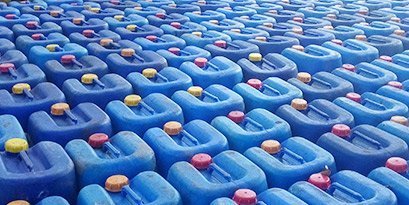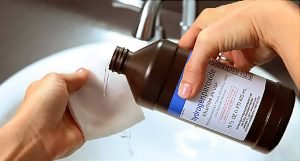Ammoniacal liquor is a concentrated solution of ammonia that is mostly used in industries. The solution is used for manufacturing processes for making fertilizer, rubber, or even medicine. It is also used as a cleaning agent. More uses are discussed in this article.
Uses of Ammoniacal Liquor
1. Fertilizer Production:
Ammoniacal liquor is commonly used in the production of fertilizers, providing a source of ammonia for plants and promoting healthy growth.
2. pH Adjustment:
Ammoniacal liquor can be used to adjust the pH of various solutions or processes, acting as a buffering agent.
3. Wastewater Treatment:
Ammoniacal liquor is utilized in wastewater treatment plants to remove pollutants, such as heavy metals, through chemical precipitation.
4. Cleaning Agent:
Ammoniacal liquor can be used as a cleaning agent for various surfaces, effectively removing grease, grime, and stubborn stains.
5. Textile Industry:
Ammoniacal liquor finds applications in the textile industry for processes such as dyeing and printing fabrics.
6. Metallurgical Processes:
Ammoniacal liquor is utilized in certain metallurgical processes, such as the leaching and extraction of metals from ores.
7. Pharmaceutical Manufacturing:
Ammoniacal liquor may be used in the manufacturing of certain pharmaceutical products or as a reagent in chemical synthesis.
8. Chemical Synthesis:
Ammoniacal liquor can be employed as a reactant or solvent in various chemical synthesis processes to produce a range of compounds.
9. Leather Industry:
Ammoniacal liquor finds applications in the leather industry for processes such as tanning and finishing leather products.
10. Food Processing:
Ammoniacal liquor may have uses in certain food processing applications, such as pH adjustment or as a component in specific formulations.
11. Gas Scrubbing:
Ammoniacal liquor is used in gas scrubbing processes to remove pollutants, such as sulfur dioxide (SO2), from industrial emissions.
12. Industrial Cleaning:
Ammoniacal liquor is employed as a cleaning agent in industrial settings, particularly for the removal of tough stains, residues, and contaminants.
13. Water Treatment:
Ammoniacal liquor can be utilized in water treatment systems to control pH levels, neutralize acidity, and prevent corrosion in pipes and equipment.
14. Paper and Pulp Industry:
Ammoniacal liquor finds applications in the paper and pulp industry for processes like pulping, bleaching, and pH adjustment during paper production.
15. Precious Metal Recovery:
Ammoniacal liquor is used in the extraction and recovery of precious metals, such as gold and silver, from electronic waste or mining operations.
16. Chemical Etching:
Ammoniacal liquor can be employed in chemical etching processes to create patterns or designs on metal surfaces for decorative or functional purposes.
17. Gas Storage and Transportation:
Ammoniacal liquor can be used in the storage and transportation of certain gases, such as ammonia, as a means to stabilize and control their release.
18. Refrigeration:
Ammoniacal liquor is utilized in certain refrigeration systems, particularly in industrial and commercial applications, as a refrigerant fluid.
19. Rubber Industry:
Ammoniacal liquor finds applications in the rubber industry for processes such as vulcanization, where it helps to improve the mechanical properties of rubber.
20. Laboratory Reagent:
Ammoniacal liquor can be used as a laboratory reagent for various analytical and experimental procedures, including titrations and chemical reactions.
21. Gasoline Additive:
Ammoniacal liquor can be used as an additive in gasoline to enhance its octane rating and improve engine performance.
22. Adhesive Manufacturing:
Ammoniacal liquor finds applications in the manufacturing of adhesives, providing bonding properties for various materials.
23. Construction Industry:
Ammoniacal liquor is used in the construction industry for various applications, such as soil stabilization and concrete production.
24. Metal Surface Treatment:
Ammoniacal liquor can be utilized for the treatment of metal surfaces, including cleaning, passivation, and rust removal.
25. Textile Printing:
Ammoniacal liquor finds applications in textile printing processes, assisting in fixing dyes to fabrics and enhancing colorfastness.
26. Waste Disposal:
Ammoniacal liquor can be utilized in waste disposal systems to neutralize acidic or alkaline waste streams and aid in the decomposition of organic matter.
27. Catalysis:
Ammoniacal liquor can act as a catalyst in certain chemical reactions, promoting the conversion of reactants into desired products.
28. Glass Manufacturing:
Ammoniacal liquor finds applications in the glass industry for processes such as glass blowing, shaping, and annealing.
29. Metal Plating:
Ammoniacal liquor is used in metal plating processes to provide a conductive medium and enhance the deposition of metal coatings.
30. Animal Feed Production:
Ammoniacal liquor can be used as an ingredient in animal feed production, providing a source of nutrients and improving digestibility.
31. Rubber Tire Manufacturing:
Ammoniacal liquor finds applications in the manufacturing of rubber tires, providing reinforcement and improving the overall performance and durability of the tires.
32. Fuel Desulfurization:
Ammoniacal liquor can be used in fuel desulfurization processes to remove sulfur compounds from fuels, reducing emissions of sulfur dioxide (SO2) during combustion.
33. Glass Etching:
Ammoniacal liquor is utilized in glass etching processes to create decorative designs or frosted effects on glass surfaces.
34. Pharmaceutical Solvent:
Ammoniacal liquor can be used as a solvent or co-solvent in the formulation of certain pharmaceutical products.
35. Waste Water Neutralization:
Ammoniacal liquor is employed in waste water treatment to neutralize acidic effluents and adjust the pH levels of the water before discharge.
36. Leather Tanning:
Ammoniacal liquor finds applications in the leather tanning industry for processes like deliming and pH adjustment during the tanning process.
37. Explosives Manufacturing:
Ammoniacal liquor is used in the manufacturing of certain explosives, acting as a component or precursor in their production.
38. Chemical Waste Treatment:
Ammoniacal liquor can be employed in the treatment of certain chemical wastes, facilitating their safe disposal or recovery.
39. Laboratory Testing:
Ammoniacal liquor is used in laboratory testing and analysis for various applications, including qualitative and quantitative analysis.
40. Acid Neutralization:
Ammoniacal liquor can be used to neutralize acidic solutions or substances, balancing pH levels and reducing acidity.
41. Metal Cleaning and Degreasing:
Ammoniacal liquor is used for metal cleaning and degreasing processes, effectively removing oils, greases, and other contaminants from metal surfaces.
42. Gas Purification:
Ammoniacal liquor can be used for gas purification, particularly in removing impurities such as hydrogen sulfide (H2S) and carbon dioxide (CO2) from natural gas or biogas.
43. Air Conditioning Systems:
Ammoniacal liquor is utilized in absorption refrigeration systems as an absorbent in the cooling cycle, contributing to the overall cooling process.
44. Dye Intermediate:
Ammoniacal liquor can serve as an intermediate in the synthesis of dyes and pigments, playing a crucial role in their production.
45. Fuel Cells:
Ammoniacal liquor can be used as a fuel or fuel source in certain types of fuel cells, contributing to the generation of electricity.
46. Catalyst Regeneration:
Ammoniacal liquor is employed in catalyst regeneration processes, restoring the activity and effectiveness of catalyst materials used in various chemical reactions.
47. Waste Gas Treatment:
Ammoniacal liquor can be used in waste gas treatment systems to remove harmful gases or pollutants, contributing to air quality improvement.
48. Agriculture:
Ammoniacal liquor can be applied as a fertilizer or soil amendment in agricultural practices, providing essential nutrients to enhance plant growth and productivity.
49. Textile Auxiliaries:
Ammoniacal liquor finds applications as textile auxiliaries, assisting in processes such as scouring, dyeing, and finishing of fabrics.
50. Paint and Coating Industry:
Ammoniacal liquor is used in the paint and coating industry as an additive or component in the formulation of paints, primers, and protective coatings.
51. Paper Recycling:
Ammoniacal liquor is used in paper recycling processes to remove ink and other contaminants from recycled paper fibers.
52. Water Purification:
Ammoniacal liquor can be utilized in water purification systems to remove impurities, chemicals, and odors, improving the quality of drinking water.
53. Chemical Precursor:
Ammoniacal liquor serves as a precursor in the production of various chemicals, including ammonium salts, nitric acid, and urea.
54. Rubber Industry:
Ammoniacal liquor finds applications in the rubber industry for processes such as latex coagulation and rubber compounding.
55. Metal Casting:
Ammoniacal liquor can be used in metal casting processes as a binder or additive in molding sands to enhance their properties.
56. Hydroponics:
Ammoniacal liquor is utilized in hydroponic systems as a source of nutrients for plants grown without soil, supporting their growth and development.
57. Petroleum Refining:
Ammoniacal liquor can be employed in petroleum refining processes, such as sweetening or desulfurization, to improve the quality of refined products.
58. Ink Manufacturing:
Ammoniacal liquor finds applications in the manufacturing of inks, including printing inks, as a solvent or component in their formulation.
59. Metal Surface Coating:
Ammoniacal liquor is used for metal surface coating processes, providing corrosion resistance, improved adhesion, and enhanced surface properties.
60. Waste Treatment:
Ammoniacal liquor can be used in waste treatment facilities to treat and neutralize various types of hazardous or toxic wastes.
61. Ceramic Glazes:
Ammoniacal liquor finds applications in ceramic glazing processes, enhancing the aesthetics and surface characteristics of ceramic products.
62. Metal Recycling:
Ammoniacal liquor is used in metal recycling operations to dissolve and remove oxides and impurities from metal surfaces, facilitating the recycling process.
63. Waste Water Treatment:
Ammoniacal liquor can be employed in waste water treatment plants to remove nitrogen compounds through biological processes, such as nitrification and denitrification.
64. Soil Amendment:
Ammoniacal liquor is used as a soil amendment to improve soil fertility, increase nutrient availability, and enhance plant growth.
65. Fire Extinguisher:
Ammoniacal liquor can be used as an agent in certain types of fire extinguishers, particularly those designed to suppress Class A fires.
66. Rubber Compounding:
Ammoniacal liquor finds applications in rubber compounding processes, contributing to the blending and processing of rubber compounds.
67. Battery Manufacturing:
Ammoniacal liquor is used in the manufacturing of batteries, particularly in certain types of electrolytes for battery cells.
68. Food Processing:
Ammoniacal liquor can be used in food processing industries as a pH adjuster, preservative, or component in various food products.
69. Surface Coating:
Ammoniacal liquor finds applications in surface coating processes, providing protection, durability, and improved appearance to various materials and substrates.
70. Metal Surface Passivation:
Ammoniacal liquor can be utilized for metal surface passivation, forming a protective layer that enhances resistance to corrosion and oxidation.
71. Textile Industry:
Ammoniacal liquor is used in the textile industry for processes such as mercerization, desizing, and scouring of fabrics.
72. Laboratory Reagent:
Ammoniacal liquor can serve as a reagent in various laboratory experiments and analyses, providing specific chemical reactions or properties.
73. Polymer Production:
Ammoniacal liquor is utilized in the production of polymers, contributing to the synthesis and processing of plastic and polymer materials.
74. Detergent Manufacturing:
Ammoniacal liquor finds applications in the manufacturing of detergents, acting as a cleaning agent or enhancing the foaming properties of the detergent formulation.
75. Adhesive Removal:
Ammoniacal liquor can be used to remove adhesives, glue residues, or stickers from various surfaces, facilitating their cleaning or restoration.
76. Pharmaceutical Industry:
Ammoniacal liquor finds applications in the pharmaceutical industry for various purposes, including pH adjustment, synthesis of certain drugs, and as a reactant in chemical processes.
77. Gas Storage:
Ammoniacal liquor can be used for gas storage purposes, such as storing and preserving gases under specific pressure and temperature conditions.
78. Cleaning Agent:
Ammoniacal liquor is utilized as a cleaning agent for various surfaces, including glass, stainless steel, and ceramic, effectively removing dirt, stains, and residues.
79. Metal Etching:
Ammoniacal liquor finds applications in metal etching processes, creating intricate designs or patterns on metal surfaces for decorative or functional purposes.
80. Odor Control:
Ammoniacal liquor can be used for odor control in various settings, such as waste treatment facilities, industrial plants, and public restrooms.
81. Air Fresheners:
Ammoniacal liquor is used in the manufacturing of air fresheners, contributing to the elimination of odors and the creation of pleasant scents.
82. Textile Printing:
Ammoniacal liquor finds applications in textile printing processes, assisting in color fixation, enhancing color intensity, and improving wash fastness.
83. Metal Surface Preparation:
Ammoniacal liquor can be utilized for the preparation of metal surfaces prior to painting, coating, or plating, ensuring proper adhesion and surface cleanliness.
84. Cooling Systems:
Ammoniacal liquor is used in cooling systems, such as industrial chillers or refrigeration units, as a coolant or heat transfer medium.
85. Cosmetics and Personal Care Products:
Ammoniacal liquor finds applications in the formulation of cosmetics and personal care products, such as hair dyes, hair styling products, and skin care preparations.
86. Ammonium Salt Production:
Ammoniacal liquor is used in the production of various ammonium salts, which find applications in agriculture, chemical synthesis, and other industries.
87. Gas Scrubbing:
Ammoniacal liquor can be used for gas scrubbing purposes, removing pollutants or acidic gases from industrial emissions or exhaust gases.
88. Pulp and Paper Industry:
Ammoniacal liquor finds applications in the pulp and paper industry, particularly in processes such as pulping, bleaching, and paper sizing.
89. Gas Detection:
Ammoniacal liquor can be used as a reagent or solution in gas detection systems, helping to identify the presence or concentration of certain gases.
90. Solar Energy Systems:
Ammoniacal liquor finds applications in solar energy systems, such as heat transfer fluids in solar thermal collectors or absorbers.
91. Electroplating:
Ammoniacal liquor is used in electroplating processes to provide a conductive medium and assist in the deposition of metal coatings on various substrates.
92. Leather Tanning:
Ammoniacal liquor finds applications in leather tanning processes, contributing to the softening, coloring, and preservation of animal hides.
93. Industrial Solvent:
Ammoniacal liquor can be used as an industrial solvent for dissolving or dispersing various substances in chemical processes or formulations.
94. Metal Treatment:
Ammoniacal liquor is used in metal treatment processes, such as pickling or descaling, to remove surface impurities, oxides, or rust from metal surfaces.
95. Concrete Additive:
Ammoniacal liquor finds applications as an additive in concrete formulations, improving workability, reducing water demand, and enhancing strength development.
96. Gasoline Additive:
Ammoniacal liquor can be used as an additive in gasoline to improve its octane rating, combustion efficiency, and overall fuel performance.
97. Silica Gel Production:
Ammoniacal liquor is utilized in the production of silica gel, a highly adsorbent material used for moisture control, gas drying, and other applications.
98. Catalyst Activation:
Ammoniacal liquor is used for the activation of certain catalysts, enhancing their activity and effectiveness in chemical reactions.
99. Welding and Soldering:
Ammoniacal liquor finds applications in welding and soldering processes, assisting in cleaning and preparing metal surfaces for proper bonding.
100. Soil pH Adjustment:
Ammoniacal liquor can be utilized to adjust the pH of soils, particularly in agriculture or gardening practices, to optimize nutrient availability and plant growth.




